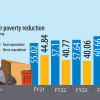Startups neglected in proposed budget
The proposed budget for fiscal year 2024-25 offered no relief to startups and neglected their long-standing demands, in sharp contrast with the government's vision for a Smart Bangladesh, where startups are key economic drivers.
Industry experts commented that in addition to not addressing their demands, the budget has also discontinued certain benefits, exacerbating the challenges faced by startups, which are already reeling from a funding crunch.
For example, Finance Minister Abul Hassan Mahmood Ali announced that investors and developers of hi-tech parks are going to lose the 10-year tax waiver on their incomes from the next fiscal.
This will hinder the growth of 13 private hi-tech parks and dent the startups established there, according to industry people.
"Such a move also contradicts the government's vision," said Russell T Ahmed, president of the Bangladesh Association of Software and Information Services (BASIS), urging the government to retain the benefits.
"Hi-tech parks are already struggling in terms of investments," he added.
As for government hi-tech parks, a 1 percent duty on capital machinery imports will be introduced from the upcoming fiscal year.
"Investors were mainly attracted to hi-tech parks due to these benefits. Removing them will discourage investment," said Mir Shahrukh Islam of Bondstein Technologies Ltd, an IoT device manufacturer.
"We urge the government to maintain the existing duty-free facilities and collaborate with the private sector to boost investment. This will significantly increase foreign investment in hi-tech parks over the next few years," said Ahmed of BASIS.
The government has already laid out its vision for a Smart Bangladesh, with key pillars such as smart citizens, smart government, smart society, and smart economy.
Under the smart economy, the ICT sector's contribution to the economy was projected at $50 billion with the goal of establishing at least 25 unicorns by 2041.
A unicorn is a startup valued at over $1 billion. The term symbolises the rare success and rapid growth often seen in innovative sectors.
Fahim Mashroor, former president of BASIS, saw nothing in the budget that could accelerate the growth of startups.
He said e-commerce and logistic startups have been demanding the withdrawal of a 15 percent VAT on parcel delivery and 5 percent VAT on online product sales. But the demand has not been met.
In the budget for FY23, the government introduced a startup sandbox, reducing the rate of turnover tax to 0.1 percent from 0.6 percent.
However, a condition was added that startups older than 5 years would be unable to avail the benefits of the sandbox.
"Most of the top startups in Bangladesh are older than 5 years. So, they cannot apply for the benefit. As far as I know, no company has availed this benefit," Mashroor added.
In the proposed budget, the government has announced tax exemptions for 19 ICT businesses for the next three years, provided they implement cashless transactions.
However, companies that provide cloud services and web hosting were removed from the list, causing concern among startups that heavily rely on such services for their operations.
Industry people said web hosting and cloud services are crucial for startups as they provide scalable, cost-effective infrastructure for online presence, data storage, and application deployment.
The tax imposition on this segment will increase the cost of doing business for the startups.
Investments in Bangladeshi startups plummeted 70 percent quarter-on-quarter to approximately $6.7 million in January-March due to the ongoing global funding downturn.
Compared to the same period last year, the decline is even steeper at 82 percent, according to LightCastle Partners, a management consulting firm.

 For all latest news, follow The Daily Star's Google News channel.
For all latest news, follow The Daily Star's Google News channel. 











Comments